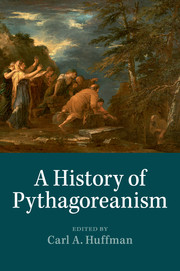Book contents
- Frontmatter
- Contents
- Contributors
- Abbreviations
- Introduction
- Chapter 1 Pythagoras
- Chapter 2 Philolaus
- Chapter 3 Archytas
- Chapter 4 Sixth-, fifth- and fourth-century Pythagoreans
- Chapter 5 The Pythagorean society and politics
- Chapter 6 The Pythagorean way of life and Pythagorean ethics
- Chapter 7 Pythagoreans, Orphism and Greek religion
- Chapter 8 The problem of Pythagorean mathematics
- Chapter 9 Pythagorean harmonics
- Chapter 10 The Pythagoreans and Plato
- Chapter 11 Aristotle on the “so-called Pythagoreans”: from lore to principles
- Chapter 12 Pythagoreanism in the Academic tradition: the Early Academy to Numenius
- Chapter 13 The Peripatetics on the Pythagoreans
- Chapter 14 Pythagoras in the historical tradition: from Herodotus to Diodorus Siculus
- Chapter 15 The pseudo-Pythagorean writings
- Chapter 16 Pythagoreans in Rome and Asia Minor around the turn of the common era
- Chapter 17 Diogenes Laertius’ Life of Pythagoras
- Chapter 18 Porphyry's Life of Pythagoras
- Chapter 19 Iamblichus’ On the Pythagorean Life in context
- Chapter 20 Pythagoras and Pythagoreanism in late antiquity and the Middle Ages
- Chapter 21 Pythagoras in the Early Renaissance
- Bibliography
- General index
- Index locorum
- Greek index
Chapter 2 - Philolaus
Published online by Cambridge University Press: 05 May 2014
- Frontmatter
- Contents
- Contributors
- Abbreviations
- Introduction
- Chapter 1 Pythagoras
- Chapter 2 Philolaus
- Chapter 3 Archytas
- Chapter 4 Sixth-, fifth- and fourth-century Pythagoreans
- Chapter 5 The Pythagorean society and politics
- Chapter 6 The Pythagorean way of life and Pythagorean ethics
- Chapter 7 Pythagoreans, Orphism and Greek religion
- Chapter 8 The problem of Pythagorean mathematics
- Chapter 9 Pythagorean harmonics
- Chapter 10 The Pythagoreans and Plato
- Chapter 11 Aristotle on the “so-called Pythagoreans”: from lore to principles
- Chapter 12 Pythagoreanism in the Academic tradition: the Early Academy to Numenius
- Chapter 13 The Peripatetics on the Pythagoreans
- Chapter 14 Pythagoras in the historical tradition: from Herodotus to Diodorus Siculus
- Chapter 15 The pseudo-Pythagorean writings
- Chapter 16 Pythagoreans in Rome and Asia Minor around the turn of the common era
- Chapter 17 Diogenes Laertius’ Life of Pythagoras
- Chapter 18 Porphyry's Life of Pythagoras
- Chapter 19 Iamblichus’ On the Pythagorean Life in context
- Chapter 20 Pythagoras and Pythagoreanism in late antiquity and the Middle Ages
- Chapter 21 Pythagoras in the Early Renaissance
- Bibliography
- General index
- Index locorum
- Greek index
Summary
Introduction
Philolaus of Croton was the first Pythagorean to write a book and so he should be of central importance for an understanding of the movement. Yet there have been persistent questions about the genuineness of his fragments, and so he has occupied an anomalous position in many accounts. In the later twentieth century, studies have sorted out the genuine from the spurious in Philolaus, and with those studies has come a new understanding of the philosopher. He has emerged as a major thinker in his own right. Increasingly he has come to be appreciated, not just as a Pythagorean, but also as an independent philosopher who interacts with the ontology, epistemology, cosmology and astronomy of his time. In this chapter we will examine Philolaus the philosopher in an attempt to understand his contributions to fifth-century thought.
Scholarly judgments
The dominant view of Philolaus in connection with Pythagoras in the mid-twentieth century can be found in J. E. Raven's treatment of the two thinkers in G. S. Kirk and J. E. Raven's influential textbook The Presocratic Philosophers (1957). On Raven's view, Pythagoras or his early followers developed two major “scientific doctrines,” “first, the ultimate dualism between Limit and Unlimited, and second, the equation of things with numbers” (229). Pythagoras himself is likely to have discovered the simple numerical ratios of musical intervals, using the length of strings on a monochord (a simple stringed instrument). He may have invented the Pythagorean theorem, recognized the incommensurability of the diagonal with the sides of a square, and enunciated the harmony of the spheres doctrine. Meanwhile, the surviving fragments of Philolaus, who allegedly philosophized in the late fifth century, were highly suspect. There were, to be sure, close parallels between Aristotle's reports of “the so-called Pythagoreans” and the Philolaus fragments, but these latter looked suspiciously like ex post facto imitations of Aristotle, and they contained epistemological speculations that seemed anachronistic; besides, Aristotle only mentioned Philolaus once, and then on a topic of moral psychology (309–11). Accordingly, “the fragments attributed to Philolaus can be dismissed, with regret but little hesitation, as part of a post-Aristotelian forgery” (311).
Keywords
- Type
- Chapter
- Information
- A History of Pythagoreanism , pp. 46 - 68Publisher: Cambridge University PressPrint publication year: 2014
- 4
- Cited by

